英语条件状语从句的用法总结
初中英语条件状语从句知识点总结
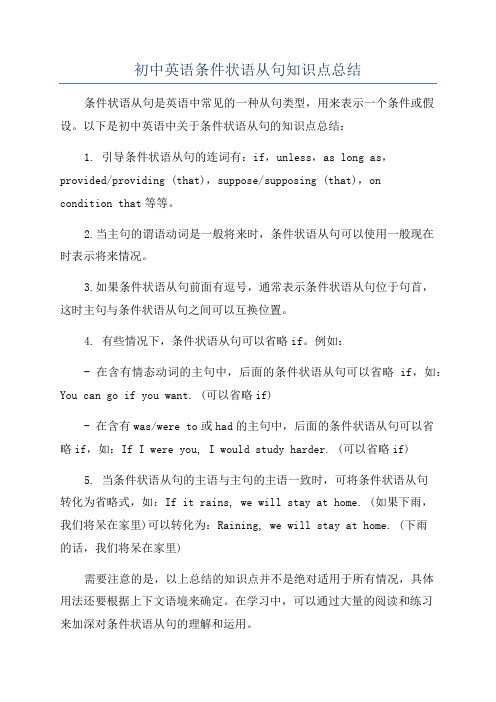
初中英语条件状语从句知识点总结
条件状语从句是英语中常见的一种从句类型,用来表示一个条件或假设。
以下是初中英语中关于条件状语从句的知识点总结:
1. 引导条件状语从句的连词有:if,unless,as long as,
provided/providing (that),suppose/supposing (that),on
condition that等等。
2.当主句的谓语动词是一般将来时,条件状语从句可以使用一般现在
时表示将来情况。
3.如果条件状语从句前面有逗号,通常表示条件状语从句位于句首,
这时主句与条件状语从句之间可以互换位置。
4. 有些情况下,条件状语从句可以省略if。
例如:
- 在含有情态动词的主句中,后面的条件状语从句可以省略if,如:You can go if you want. (可以省略if)
- 在含有was/were to或had的主句中,后面的条件状语从句可以省
略if,如:If I were you, I would study harder. (可以省略if)
5. 当条件状语从句的主语与主句的主语一致时,可将条件状语从句
转化为省略式,如:If it rains, we will stay at home. (如果下雨,
我们将呆在家里)可以转化为:Raining, we will stay at home. (下雨
的话,我们将呆在家里)
需要注意的是,以上总结的知识点并不是绝对适用于所有情况,具体
用法还要根据上下文语境来确定。
在学习中,可以通过大量的阅读和练习
来加深对条件状语从句的理解和运用。
英语语法讲解之条件状语从句

英语-条件状语从句定义:条件状语从句是表示主句动作发生的前提或条件的从句。
条件状语从句分为真实条件状语从句和非真实条件状语从句。
引导条件状语从句的有if,unless,so / as long as,as / so far as,on condition that,in case,suppose,supposing 等。
条件状语从句中的谓语动词一般要用现在时或过去时代替一般将来时或过去将来时。
知识梳理:初中学习到的引导条件状语从句的连接词主要有:if(如果)、unless(除非)或as long as(只要) 等。
unless 在意思上等于if...not。
一、条件状语从句用法1、引导条件状语从句最常用的连词是if,由if 引导的条件状语从句表示在某种条件下某事很可能发生。
如:If you ask him, he will help you.如果你请他帮忙,他会帮你的。
If you fail in the exam, you will let him down.如果你考试不及格,你会让他失望的。
另外,if 从句还表示不可实现的条件或根本不可能存在的条件,也就是一种虚拟的条件或假设,从句多用一般过去时或过去完成时。
如: If I were you, I would invite him to the party.如果我是你,我会邀请他参加聚会。
2、unless = if...not. 除非,若不,除非在……的时候Let's go out for a walk unless you are too tired.=If you are not too tired, let's go out for a walk.Unless it rains, the game will be played.除非下雨,比赛将照常进行。
3、so/as long as 只要You may borrow my book as long as you keep it clean.只要你保持书的清洁,你就可以把我的书借去。
条件状语从句的总结
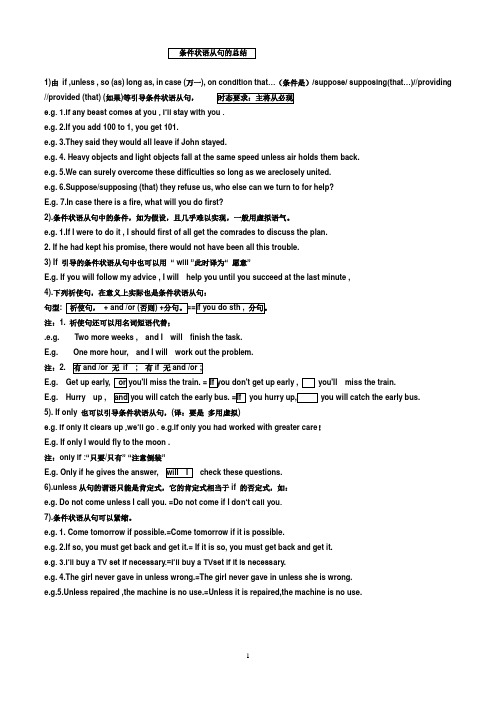
1)由if ,unless , so (as) long as, in case (万一), on condition that…(条件是)/suppose/ supposing(that…)//providing//provided (that) (如果)等引导条件状语从句,e.g. 1.If any beast comes at you , I’ll stay with you .e.g. 2.If you add 100 to 1, you get 101.e.g. 3.They said they would all leave if John stayed.e.g. 4. Heavy objects and light objects fall at the same speed unless air holds them back.e.g. 5.We can surely overcome these difficulties so long as we areclosely united.e.g. 6.Suppose/supposing (that) they refuse us, who else can we turn to for help?E.g. 7.In case there is a fire, what will you do first?2).条件状语从句中的条件,如为假设,且几乎难以实现,一般用虚拟语气。
e.g. 1.If I were to do it , I should first of all get the comrades to discuss the plan.2. If he had kept his promise, there would not have been all this trouble.3) If 引导的条件状语从句中也可以用“ will ”此时译为“ 愿意”E.g. If you will follow my advice , I will help you until you succeed at the last minute ,4).下列祈使句,在意义上实际也是条件状语从句:句型注:1. 祈使句还可以用名词短语代替;.e.g. Two more weeks , and I will finish the task.E.g. One more hour, and I will work out the problem.注:2.E.g. you'll miss the train.E.g. Hurry up , you will catch the early bus.5). If only 也可以引导条件状语从句,(译:要是多用虚拟)e.g. If only it clears up ,we’ll go . e.g.If only you had worked with greater care!E.g. If only I would fly to the moon .注:only if :“只要/只有” “注意倒装”E.g. Only if he gives the answer, check these questions.6).unless从句的谓语只能是肯定式,它的肯定式相当于if 的否定式,如:e.g. Do not come unless I call you. =Do not come if I do n’t call you.7).条件状语从句可以紧缩。
条件状语从句用法归纳

条件状语从句用法归纳条件状语从句,这可是英语学习中的一个重要知识点哦!咱们今天就来好好唠唠它。
先来说说啥是条件状语从句。
简单来讲,条件状语从句就是表示条件的句子,通常由 if(如果)、unless(除非)、as/so long as(只要)等引导。
比如说“If it rains tomorrow, we will stay at home”(如果明天下雨,我们就待在家里。
)这里的“If it rains tomorrow”就是条件状语从句啦。
那条件状语从句有啥用法呢?第一种,真实条件句。
就是说这个条件是有可能实现的。
比如说“If you study hard, you will pass the exam”(如果你努力学习,你就会通过考试。
)这就是很实在的情况,只要你真的努力学了,通过考试的可能性很大。
第二种,非真实条件句,也就是虚拟条件句。
这就有点想象的成分啦。
像“If I were a bird, I would fly freely in the sky”(如果我是一只鸟,我会在天空自由飞翔。
)可咱实际上不是鸟呀,这就是想象出来的情况。
咱们来通过一个小例子感受感受。
有一次,我在课堂上讲条件状语从句,我问同学们:“If you had a million dollars, what would you do?” 有个调皮的小男生立马站起来说:“If I had a million dollars, I would buy abig house and a super cool car for my teacher!” 全班哄堂大笑,我也忍不住笑了。
这孩子,还挺会哄老师开心呢!接下来说说条件状语从句的时态问题。
在真实条件句中,如果主句是一般将来时,从句要用一般现在时。
就像“If you come here tomorrow, I will be very happy” 而在虚拟条件句中,时态就有很多变化啦,这可得好好记住。
中考英语知识点条件状语从句用法
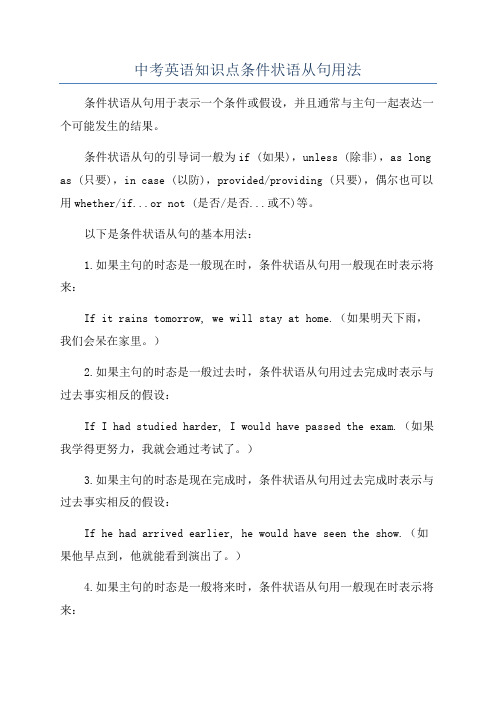
中考英语知识点条件状语从句用法条件状语从句用于表示一个条件或假设,并且通常与主句一起表达一个可能发生的结果。
条件状语从句的引导词一般为if (如果),unless (除非),as long as (只要),in case (以防),provided/providing (只要),偶尔也可以用whether/if...or not (是否/是否...或不)等。
以下是条件状语从句的基本用法:1.如果主句的时态是一般现在时,条件状语从句用一般现在时表示将来:If it rains tomorrow, we will stay at home.(如果明天下雨,我们会呆在家里。
)2.如果主句的时态是一般过去时,条件状语从句用过去完成时表示与过去事实相反的假设:If I had studied harder, I would have passed the exam.(如果我学得更努力,我就会通过考试了。
)3.如果主句的时态是现在完成时,条件状语从句用过去完成时表示与过去事实相反的假设:If he had arrived earlier, he would have seen the show.(如果他早点到,他就能看到演出了。
)4.如果主句的时态是一般将来时,条件状语从句用一般现在时表示将来:5. 在虚拟语气中,如果条件从句表示的是与现在相反的假设时,条件从句用过去时态,主句用 would/could/might + 动词原形或 should + 动词原形表示:If I were rich, I would travel around the world.(如果我富有,我会环游世界。
)6. 在虚拟语气中,如果条件从句表示的是与过去相反的假设时,条件从句用过去完成时,主句用 would/could/might + have + 过去分词表示:If I had known it, I would have told you.(如果我当时知道了,我会告诉你的。
英语条件状语从句的几种情况
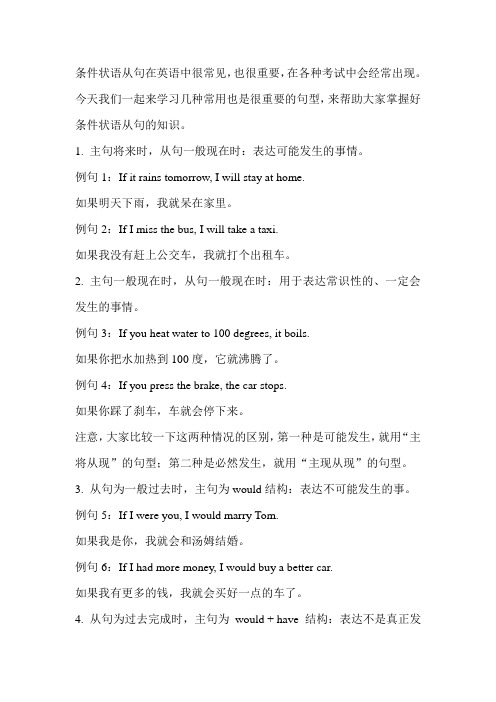
条件状语从句在英语中很常见,也很重要,在各种考试中会经常出现。
今天我们一起来学习几种常用也是很重要的句型,来帮助大家掌握好条件状语从句的知识。
1. 主句将来时,从句一般现在时:表达可能发生的事情。
例句1:If it rains tomorrow, I will stay at home.如果明天下雨,我就呆在家里。
例句2:If I miss the bus, I will take a taxi.如果我没有赶上公交车,我就打个出租车。
2. 主句一般现在时,从句一般现在时:用于表达常识性的、一定会发生的事情。
例句3:If you heat water to 100 degrees, it boils.如果你把水加热到100度,它就沸腾了。
例句4:If you press the brake, the car stops.如果你踩了刹车,车就会停下来。
注意,大家比较一下这两种情况的区别,第一种是可能发生,就用“主将从现”的句型;第二种是必然发生,就用“主现从现”的句型。
3. 从句为一般过去时,主句为would结构:表达不可能发生的事。
例句5:If I were you, I would marry Tom.如果我是你,我就会和汤姆结婚。
例句6:If I had more money, I would buy a better car.如果我有更多的钱,我就会买好一点的车了。
4. 从句为过去完成时,主句为would + have 结构:表达不是真正发生的事,也就是事情没有发生。
例句7. If I had studied harder, I would have passed my exam.如果我再努力学习一点,我就通过考试了。
(注:实际上没有通过)例句8:If I hadn’t woken up late, I wouldn’t have missed my train.如果我没有睡过头,我就不会错过火车了。
条件状语从句的不同形式与用法解析
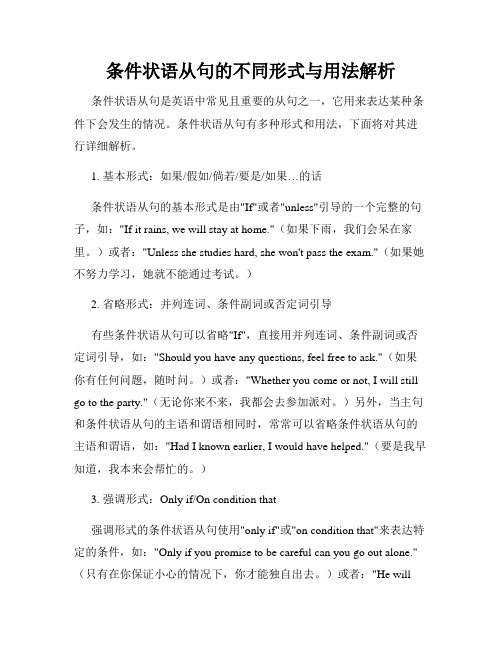
条件状语从句的不同形式与用法解析条件状语从句是英语中常见且重要的从句之一,它用来表达某种条件下会发生的情况。
条件状语从句有多种形式和用法,下面将对其进行详细解析。
1. 基本形式:如果/假如/倘若/要是/如果…的话条件状语从句的基本形式是由"If"或者"unless"引导的一个完整的句子,如:"If it rains, we will stay at home."(如果下雨,我们会呆在家里。
)或者:"Unless she studies hard, she won't pass the exam."(如果她不努力学习,她就不能通过考试。
)2. 省略形式:并列连词、条件副词或否定词引导有些条件状语从句可以省略"If",直接用并列连词、条件副词或否定词引导,如:"Should you have any questions, feel free to ask."(如果你有任何问题,随时问。
)或者:"Whether you come or not, I will still go to the party."(无论你来不来,我都会去参加派对。
)另外,当主句和条件状语从句的主语和谓语相同时,常常可以省略条件状语从句的主语和谓语,如:"Had I known earlier, I would have helped."(要是我早知道,我本来会帮忙的。
)3. 强调形式:Only if/On condition that强调形式的条件状语从句使用"only if"或"on condition that"来表达特定的条件,如:"Only if you promise to be careful can you go out alone."(只有在你保证小心的情况下,你才能独自出去。
初中英语知识点归纳条件状语从句的引导词和用法

初中英语知识点归纳条件状语从句的引导词和用法条件状语从句是英语语法中的一种特殊句型,用来表示某个条件成立时会发生的情况。
在条件状语从句中,引导词起到引导从句的作用。
本文将对初中英语知识点中的条件状语从句的引导词和用法进行归纳。
一、if引导的条件状语从句1. 当主句是一般现在时时,条件状语从句可以是一般现在时或should + 动词原形。
例如:- If he comes early, we will go to the movies together.- If it rains tomorrow, we should stay at home.2. 当主句是一般过去时时,条件状语从句要用过去时态。
例如:- If I had money, I would buy a new car.- If he studied hard, he could pass the exam.3. 当主句是一般将来时时,条件状语从句可以使用一般现在时或一般过去时。
例如:- If you go shopping, I will wait for you here.- If I had time, I would help you with your homework.二、unless引导的条件状语从句1. Unless 在句中的含义与if相反,表示“除非”,引导的条件状语从句与if引导的条件状语从句的用法相同。
例如:- I won't go to the party unless you invite me.- Unless you practice more, you won't improve your English.三、as long as引导的条件状语从句1. As long as 表示“只要”,引导的条件状语从句要使用一般现在时。
例如:- You can join us as long as you finish your homework.- As long as you work hard, you will succeed.四、in case引导的条件状语从句1. In case 表示“以防”,引导的条件状语从句使用一般现在时。
- 1、下载文档前请自行甄别文档内容的完整性,平台不提供额外的编辑、内容补充、找答案等附加服务。
- 2、"仅部分预览"的文档,不可在线预览部分如存在完整性等问题,可反馈申请退款(可完整预览的文档不适用该条件!)。
- 3、如文档侵犯您的权益,请联系客服反馈,我们会尽快为您处理(人工客服工作时间:9:00-18:30)。
条件状语从句的用法总结
条件状语从句就是在复合句中表示主句动作发生条件的状语从句。
引导条件状语从句最经常用的连词是if,它的意思是“如果”;除此之外,还有unless (=if…not如果不……,除非), as/so long as(只要), while(=as long as只要), supposing (that)/provided /providing (that)(假如), in case(假使), on condition that(在……的条件下)等。
它们也多少含有“如果”的意思,也可用于引导条件状语从句。
1. 用if引导:if意为“如果”。
如:
You can’t take photographs if the light is bad. 光线不足,就无法拍照。
If you cheat in the exam you’ll never get away with it. 考试作弊必予追究。
2. 用unless引导:unless的意思是“如果不”“除非”。
如:
Don’t act unless you’re certain. 没有把握就不要做。
Unless you go at once you will be late. 如果你不马上走,就会迟到的。
3. 用as [so] long as引导:as [so] long as的意思是“如果”“只要”。
如:
I’ll remember that day as long as I live. 只要我活着,我就不会忘记那个日子。
You may take my dictionary as long as you don’t keep it too long. 只要使用时间不太长,你可以把我的词典拿去。
4. 用in case引导:in case用连词引导条件状语从句时,其意为“如果”“万一”。
如:
In case I’m late, start without me. 万一我迟到,就不等我了。
In case I forget, please remind me about it. 万一我忘记,请提醒我一下。
5. 条件状语从句的时态:当主句为将来时态或含有将来意义时,条件状语从句习惯上要用一般现在时表示将来意义,而不能直接使用将来时态。
如:
■不知道明天是否会下雨,但要是下雨的话,我就呆在家里。
误:I don’t know if it will rain tomorrow. But if it will rain tomorrow, I’ll stay at home.
正:I don’t know if it will rain tomorrow. But if it rains tomorrow, I’ll stay at home.
句中的第一个 if 引导的是宾语从句(if=是否),从句谓语用将来时态表示将来意义;第二个if引导的是条件状语从句(if=如果),从句谓语要用一般现在时表示将来意义。
